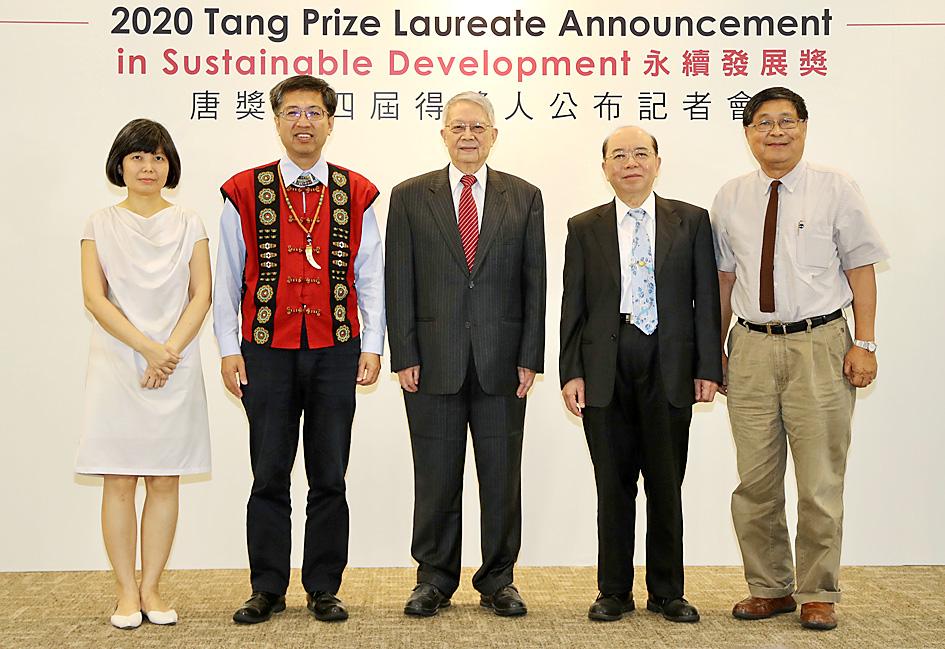The Tang Prize Foundation yesterday named English primatologist and anthropologist Jane Goodall as the winner of the fourth Tang Prize in sustainable development.
The award recognizes Goodall for her “groundbreaking discovery in primatology that redefines human-animal relationship and for her lifelong, unparalleled dedication to the conservation of Earth’s environment,” the Taipei-based foundation’s award citation said.
Goodall began studying primates in Gombe Stream National Park, Tanzania, in 1960 at the age of 26, after she obtained a grant under the auspices of anthropologist Louis Leakey.

Photo: CNA
“Her discovery in 1960 that chimpanzees make and use tools rocked the scientific world and redefined the relationship between humans and animals,” it said.
Goodall observed and recorded chimpanzee behavior, such as making small tools to probe termite tunnels, gesturing to each other with actions such as begging with outstretched hands, patting and embracing, which provided a “firm basis” for a wide range of evolutionary theorizing, the foundation said.
Goodall, 86, has established several institutions and programs for studying wildlife and promoting environmental conservation, including the Gombe Stream Research Center (1965), the Jane Goodall Institute (1977), which established a branch in Taiwan in 1998, and the Roots and Shoots Program (1991), which has branches in more than 100 nations, including Taiwan.
Goodall has won numerous awards and recognition, including the Gold Medal Award from the UN Educational, Scientific and Cultural Organization (UNESCO) in 2006. She was named a UN Messenger of Peace in 2002.
She continues to travels the world to speak about the threats facing chimpanzees, environmental crises and the collective power of individual actions.
Taiwanese entrepreneur Samuel Yin (尹衍樑), chairman of the Ruentex Group, established the biennial Tang Prize in 2012, to honor people who have made prominent contributions in four categories: sustainable development, biopharmaceutical science, Sinology and rule of law.
Winners of the prize receive a cash award of NT$40 million (US$1.35 million) and NT$10 million in research funding, along with a gold medal and a certificate.
Former Norwegian prime minister Gro Harlem Brundtland won the first Tang Prize in sustainable development in 2014, followed by US physicist Arthur Rosenfeld in 2016, and James Hansen, director of the Program on Climate Science, Awareness and Solutions of Columbia University’s Earth Institute and Veerabhadran Ramanathan, director of the Center for Clouds, Chemistry and Climate at the Scripps Institute of Oceanography in 2018.
The foundation is to announce the winner of biopharmaceutical science today, followed by Sinology on tomorrow and rule of law on Sunday.
The award ceremony and related events are to be held in late September in Taipei.

Taiwan has received more than US$70 million in royalties as of the end of last year from developing the F-16V jet as countries worldwide purchase or upgrade to this popular model, government and military officials said on Saturday. Taiwan funded the development of the F-16V jet and ended up the sole investor as other countries withdrew from the program. Now the F-16V is increasingly popular and countries must pay Taiwan a percentage in royalties when they purchase new F-16V aircraft or upgrade older F-16 models. The next five years are expected to be the peak for these royalties, with Taiwan potentially earning

STAY IN YOUR LANE: As the US and Israel attack Iran, the ministry has warned China not to overstep by including Taiwanese citizens in its evacuation orders The Ministry of Foreign Affairs (MOFA) yesterday rebuked a statement by China’s embassy in Israel that it would evacuate Taiwanese holders of Chinese travel documents from Israel amid the latter’s escalating conflict with Iran. Tensions have risen across the Middle East in the wake of US and Israeli airstrikes on Iran beginning Saturday. China subsequently issued an evacuation notice for its citizens. In a news release, the Chinese embassy in Israel said holders of “Taiwan compatriot permits (台胞證)” issued to Taiwanese nationals by Chinese authorities for travel to China — could register for evacuation to Egypt. In Taipei, the ministry yesterday said Taiwan

Taiwan is awaiting official notification from the US regarding the status of the Agreement on Reciprocal Trade (ART) after the US Supreme Court ruled US President Donald Trump's global tariffs unconstitutional. Speaking to reporters before a legislative hearing today, Premier Cho Jung-tai (卓榮泰) said that Taiwan's negotiation team remains focused on ensuring that the bilateral trade deal remains intact despite the legal challenge to Trump's tariff policy. "The US has pledged to notify its trade partners once the subsequent administrative and legal processes are finalized, and that certainly includes Taiwan," Cho said when asked about opposition parties’ doubts that the ART was

If China chose to invade Taiwan tomorrow, it would only have to sever three undersea fiber-optic cable clusters to cause a data blackout, Jason Hsu (許毓仁), a senior fellow at the Hudson Institute and former Chinese Nationalist Party (KMT) legislator, told a US security panel yesterday. In a Taiwan contingency, cable disruption would be one of the earliest preinvasion actions and the signal that escalation had begun, he said, adding that Taiwan’s current cable repair capabilities are insufficient. The US-China Economic and Security Review Commission (USCC) yesterday held a hearing on US-China Competition Under the Sea, with Hsu speaking on